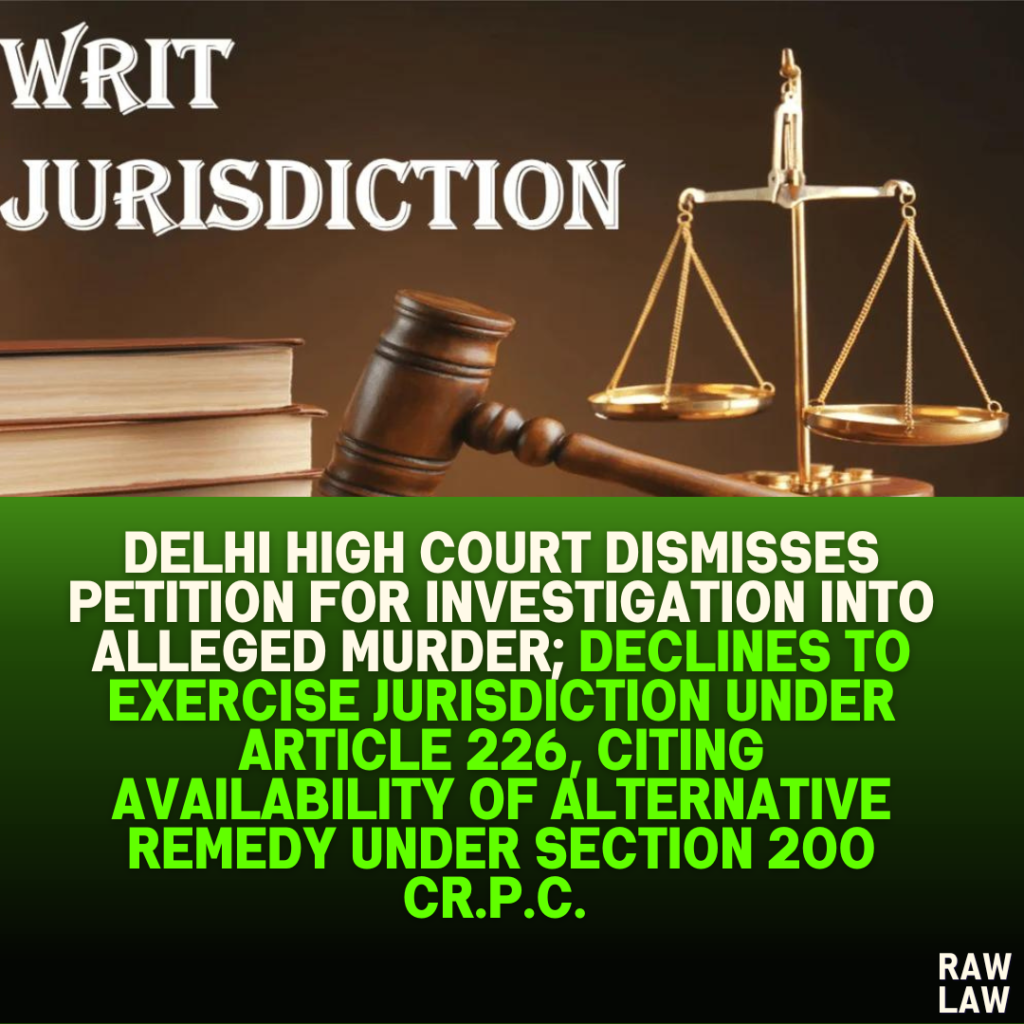Court’s Decision:
The petition under Article 226 of the Constitution was dismissed by the High Court, with the court granting the petitioner the liberty to approach the competent court for alternative remedies under Section 200 Cr.P.C. The court made it clear that it did not enter into the merits of the case, and no opinion was expressed on them.
Facts:
The petitioner, son-in-law of the late Mr. Deepak Chaudhary, alleged that his father-in-law was murdered by certain high dignitaries. Post his death, several illegal demat and trading accounts were allegedly opened and operated by the accused. The petitioner also claimed that his family’s phones and devices were tapped, their home was under surveillance, and his family received threats. Various complaints to authorities like the RBI, CBI, and SEBI yielded no action, and an application under Section 156(3) was dismissed by the Patiala House Court in 2020. The petitioner sought court-supervised protection and investigation into these alleged incidents.
Issues:
- Whether the petition was maintainable under Article 226.
- Whether the petitioner had an alternative, more effective remedy available under Cr.P.C.
- Whether the court could intervene to direct an investigation based on the petitioner’s claims.
Petitioner’s Arguments:
The petitioner argued that the authorities had failed to act on complaints related to the murder of his father-in-law, siphoning of funds, and other serious allegations like surveillance and hacking. He also alleged that his family faced continuous threats and that the police had refused to take proper action.
Respondent’s Arguments:
The respondents, representing the Union of India, contended that the petitioner had alternative remedies under Cr.P.C., which he had not exhausted. They further argued that the petitioner’s claims were vague, unsubstantiated, and that the High Court should not interfere when alternative remedies exist.
Analysis of the Law:
The court analyzed the principle of exhausting alternative remedies, emphasizing that writ petitions under Article 226 should not ordinarily be entertained when statutory remedies are available. It referenced key precedents, including Sakiri Vasu v. State of U.P. and Thansingh Nathmal v. Superintendent of Taxes, which held that a petitioner must first approach alternative legal forums.
Precedent Analysis:
The court relied on Sakiri Vasu v. State of U.P. (2008) and State of Orissa v. Ujjal Kumar Burdhan (2012), which laid down that the High Court should not intervene when alternative statutory remedies are available. It further cited Lalita Kumari v. Government of U.P. to underscore that the proper procedure is to approach the police and then seek judicial intervention under Cr.P.C. if the authorities fail to act.
Court’s Reasoning:
The court observed that the petitioner had not availed himself of the alternative remedy of filing a criminal complaint under Section 200 Cr.P.C. Moreover, it found the allegations in the petition to be wide and vague, lacking substantive evidence. Given these factors, the court declined to exercise its jurisdiction under Article 226.
Conclusion:
The petition was dismissed, and the petitioner was granted the liberty to approach the Magistrate or another competent court to seek redress. The court also directed that the local police should consider any security requests from the petitioner in accordance with the law.
Implications:
The case reaffirms the principle that writ petitions should not bypass statutory remedies. It also highlights the importance of substantiating claims when seeking judicial intervention under Article 226. This decision could set a precedent for future cases where petitioners attempt to invoke constitutional remedies without exhausting available legal avenues.




Pingback: J&K HC Quashes Preventive Detention Order Citing Violation of Article 22(5) Due to Non-Supply of Essential Documents and Denial of Opportunity for Effective Representation - Raw Law